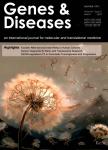Lack of interferon regulatory factor 3 leads to anxiety/depression-like behaviors through disrupting the balance of neuronal excitation and inhibition in mice
作者机构:Pediatric Research InstituteMinistry of Education Key Laboratory of Child Development and DisordersNational Clinical Research Center for Child Health and DisordersChina International Science and Technology Cooperation Base of Child Development and Critical DisordersChongqing Key Laboratory of Translational Medical Research in Cognitive Development and Learning and Memory DisordersChildren's Hospital of Chongqing Medical UniversityChongqing 400014China
出 版 物:《Genes & Diseases》 (基因与疾病(英文))
年 卷 期:2023年第10卷第3期
页 面:1062-1074页
核心收录:
学科分类:0710[理学-生物学] 1002[医学-临床医学] 100205[医学-精神病与精神卫生学] 10[医学]
基 金:supported by grants from the National Natural Science Foundation of China(No.82071395 and 82001158) the Natural Science Foundation of Chongqing,China(No.cstc2021ycjh-bgzxm0186 and cstc2020jcyj-zdxmX0004) the Science and Technology Research Program of Chongqing Municipal Education Commission,China(No.KJZD-K201900403) Innovation Research Group at Institutions of Higher Education in Chongqing,China(No.CXQTP19034) CQMU Program for Youth Innovation in Future Medicine,China(No.W0044).
主 题:Anxiety Depression Hippocampus IRF3 Medial prefr ontal cortex Synaptic transmission
摘 要:Disrupting the balance of neuronal excitation and inhibition (E/I) is an important pathogenic mechanism of anxiety and depression. Interferon regulatory factor 3 (IRF3) plays a key role in the innate immune response, and activation of IRF3 triggers the expression of type I interferons and downstream interferon-stimulated genes, which are associated with anxiety and depression. However, whether IRF3 participates in the pathogenesis of anxiety/depression by regulating E/I balance remains poorly understood. Here, we reported that global knockout (KO) of IRF3 (IRF3^(−/−)) significantly increased anxiety/depression-like behaviors, but did not affect normal spatial learning and memory. Compared with wild type (WT) control mice, the E/I balance was disrupted, as reflected by enhanced glutamatergic transmission and decreased GABAergic transmission in the neurons of hippocampal CA1 and medial prefrontal cortex (mPFC) in IRF3-KO mice. Importantly, genetic rescue of IRF3 expression by adeno-associated virus (AAV) was sufficient to alleviate anxiety/depression-like behaviors and restore the neuronal E/I balance in IRF3-KO mice. Taken together, our results indicate that IRF3 is critical in maintaining neuronal E/I balance, thereby playing an essential role in ensuring emotional stability.



